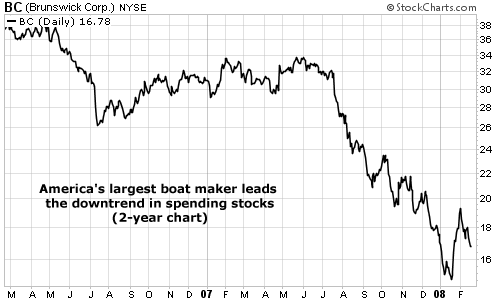| Home | About Us | Resources | Archive | Free Reports | Market Window |
The Individual Investor's Ultimate Competitive AdvantageBy
Thursday, February 21, 2008
Over the last 10 years, I've written about everything from solar panels, corn futures, and waste-hauling companies to Internet security systems, railroad cars, and Wal-Mart.
Of all the businesses I've covered, from booksellers to gun manufacturers, I've learned to love three a little more than all the rest: insurance, lending, and asset management. All three of these businesses have one thing in common: other people's money. Insurance has float, banking is funded with debt and deposits, and asset management is all about managing other people's money. I think the ultimate competitive advantage in all of these businesses is character. In all three businesses, as George Bernard Shaw put it in The Vice of Gambling and The Virtue of Insurance, "A bookmaker who gambles will ruin himself as certainly as a [bartender] who drinks..." The bookmaker, the bartender, the insurer, the banker, and the asset manager, must all stand next to those who take bigger risks for inadequate compensation and take smaller risks for adequate or better compensation. They must all look beyond the present moment, to the long-term consequences, and act in accordance with that vision, effectively shutting off their senses to the noise around them. It's hard to do the same thing everyone else is doing, but do it the exact opposite way everyone else is doing it. If you have the character and skill to pull it off, you can find great success in the world of finance. For example, as an asset manager, you need to understand and assign greater weight to investment risk, and learn to assign much less weight to the widely perceived risk called market volatility. In his classic work The Common Law, Oliver Wendell Holmes writes, "Relatively to a given human being, anything is accident which he could not fairly have been expected to contemplate as possible..." And yet, investing requires the intellectual exercise of contemplating possible and probable "accidents." Not everyone can do it. But if you can, there are few vocations where those skills more directly correlate with profitability and long-term success than in insurance, banking, and asset management. Last week, I explained how to gain an advantage over almost every other investor in the market: First, buy seldom. Then, when you buy, buy big. And finally, be patient. Most investors lack the character and skill to pull this off. Ah... but if you buy shares of the best asset managers, insurance companies, and lending operations, you tip the odds back in your favor. All the money you put into those stocks will have cleared the "buy seldom, buy big, and be patient" hurdles. You'll have placed your capital in the hands of those who follow those rules more successfully than most people in the world do anything. Good investing, Dan Ferris
Further Reading:
The Low-Risk Way to Make 15% a Year for More Than 30 Years Market NotesTHE BIG-SPENDING DOWNTREND IS STILL FIRMLY IN PLACE A great destruction of wealth began in 2006, when stocks dependent on a free-spending American consumer finally found a top. Many of these stocks – from motorcycle makers to swimming pool builders – were huge winners early in the decade. Americans felt flush with real estate and stock profits and were ready to spend money on anything. Starbucks shares, for instance, quadrupled from 2002 to 2006. As I mentioned in this column last fall, the spending binge ended along with the absurd home credit binge... and sent shares of the finest American companies into the tank. Harley-Davidson, America's largest motorcycle producer, is down 50% from its 2006 high. Starbucks, America's largest coffee chain, is down 55%. Brunswick, America's largest recreational boat maker, is down 59%. Pool Corp, America's largest swimming pool company, is down 60%. The list goes on. These stocks will be incredible buys when the sector hits bottom and the economy gets back on track. For now though, we stand back and watch them fall, take a rest, then fall, take a rest, then fall... The trend in "spending stocks" is still down.
|
Recent Articles
|

